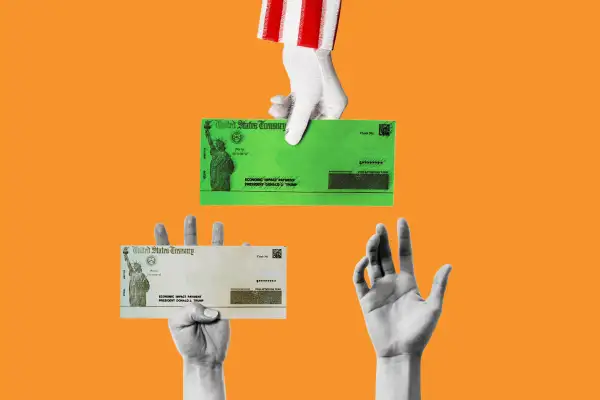New Stimulus Checks and Reduced Unemployment Benefits: What We Know About the Next Coronavirus Relief Package

Attention Americans: Another huge federal coronavirus relief package that includes more direct stimulus check payments is coming your way soon — probably.
The White House, leaders of both major political parties, and the general public have all voiced support for a follow-up to the first massive coronavirus relief program, which was passed in March. Dubbed the CARES Act, it provided a wide range of assistance, including forgivable small business loans, an extra $600 per week in unemployment benefits, breaks on student loans, and (of course) those $1,200 stimulus checks.
Four months later, the $1,200 payments have long since been spent by many Americans, and the extra unemployment benefits are set to expire. Meanwhile, the coronavirus is still spreading in many states, the U.S. unemployment rate remains over 11%, the national economy is not remotely back to normal — and no new coronavirus relief legislation has been passed.
House Democrats unveiled a $3 trillion relief proposal in May that included a second round of stimulus checks, added food stamp benefits, and extensions on the $600 weekly unemployment insurance payments. Senate Majority Leader Mitch McConnell (R-KY) was expected to release a much smaller proposal on Thursday, July 23, but discussions are still occurring and it's now expected that the GOP plan will be released on Monday, July 27. Estimated at around $1 trillion, McConnell's bill (or, more likely, a series of bills) will likely provide funding for more coronavirus testing, assistance for schools to reopen, an extension of extra unemployment benefit payments, and a second stimulus check paid to eligible Americans.
Nearly every aspect of new federal coronavirus relief legislation is in negotiations, and House Minority Leader Kevin McCarthy (R-CA) has said he doesn't expect a bill to be passed until August at the earliest. Assuming it passes at all.
As you can see, much is up in the air regarding further coronavirus relief. Here's what we know about where things stand, and we will update this story as more details crystallize.
Who Gets a Second Stimulus Check? How Much Will You Get, and When?
Unsurprisingly, most Americans want a second stimulus check — who wouldn't want free money, after all? But it's not just about a handout. According to a recent survey conducted for Money, 42% of participants said they need a second stimulus check in order to pay for essential expenses like housing and food.
Trump supporters and critics alike are both strongly in favor of another round of stimulus checks. According to the survey, 74% of people who have very favorable views of President Trump and 78% of people how have very unfavorable views of President Trump say that a second stimulus check would be either necessary or at least helpful to pay essential expenses.
Support from all sides of the political sphere increases the likelihood that more stimulus checks will be issued. But who will be eligible (and ineligible)? How much money will people get this time around? And when will new Economic Impact Payments (the official IRS term for stimulus checks) be issued?
For now, there are no answers, or even a consensus in a very divided Congress, on any of these topics. For the first stimulus checks, which were paid out as part of the monumental $2 trillion CARES Act, the eligibility requirements were based on the adjusted gross income (AGI) from your most recent tax returns. If your AGI was $75,000 or less for individual tax filers or $150,000 or less for married couples filing jointly, then you received the full amount: $1,200 per adult. Families also received an extra $500 per eligible child (under age 17). Initially, observers worried that it could take months for stimulus payments to be sent to taxpayers, but the IRS says the vast majority of recipients got their checks within a few weeks of the program being kicked off.
The possibility of a second stimulus check for coronavirus relief has been in discussions at least since mid-April — which is when people began receiving their first checks. Earlier this summer, Democrats in Congress have introduced legislation for new rounds of stimulus checks, with proposed payments ranging from $1,200 per eligible family member to upwards of $2,000 per month to every person in America.
So far, these proposals have gone nowhere. At the same time, though, the White House and many Republican leaders have voiced general support for a second stimulus check. In early July, Sen. McConnell told reporters that he'd soon be unveiling another coronavirus relief bill, and that it "could well" feature direct payments of perhaps $1,200 to lower-income Americans. “I think the people who have been hit the hardest are people who make about $40,000 a year or less,” McConnell said.
House Speaker Nancy Pelosi (D-CA) has said she is unsure of where the $40,000 figure came from, and has joined many others arguing that people making over that amount are often also struggling financially — especially if they live in expensive cities. "I think families making over $40,000 probably need assistance, depending on their situation," Pelosi said recently.
Meanwhile, Treasury Secretary Steven Mnuchin said on Thursday that the second round of direct stimulus checks would again max out at $1,200 per adult and go to the same people who received stimulus checks previously this year, according to the Wall Street Journal. And Mnuchin said the new stimulus checks would go out very soon: "The President’s focus is he wants to get money into people’s pockets now, because we need to reopen the economy," Mnuchin said on CNBC on Thursday. "The President’s preference is to make sure that we send out Direct Payments quickly so that in August, people get more money."
Still, right now, virtually everything regarding a second round of stimulus checks — who is eligible, how much payments will be and when (or even if) there will be another direct payment — is very much uncertain, and up for debate. An early draft of the Senate Republican proposal in circulation on Thursday "did not specify who would receive the direct payments or how much the checks would be," according to The New York Times. Stay tuned, and we will update this story when more information is available.
About That Payroll Tax Cut...
A new addition that was being pushed by the Trump administration that was not included in the original CARES Act is a payroll tax cut for employees. These cuts would allow workers to take home the 7.65% of their paycheck that is usually deducted to fund Social Security and Medicare for the duration of the pandemic.
However, Senate Republicans announced on Thursday, July 23 that they will not be including the proposed tax cut in their coronavirus relief bill, instead opting for the inclusion of a second round of stimulus checks. But according to U.S. Treasury Secretary Steven Mnuchin, the tax cut is not off the table and may be included in another piece of legislation later on.
While some workers would be happy to see a much larger number hitting their bank accounts, critics of the provision have noted that a payroll tax cut will not help with the current unemployment crisis, as those who aren’t working don’t currently pay those taxes.
Additionally, the proposed tax cut would likely send Social Security into an even weaker state. According to the Social Security Administration, just under 90% of total benefits, which over 63 million Americans rely on, comes from these payroll taxes.
Enhanced Unemployment Benefits Set to Expire
Some of the most pressing discussions right now surround the fact that the historic enhanced unemployment insurance benefits made possible through the CARES Act are set to expire at the end of July, despite the fact that jobless claims have exceeded one million people per week for over four months.
While the additional $600 per week that people who’ve lost their jobs have been receiving has helped to stave off the detrimental fallout of the recession, critics claim that the checks disincentivize people from returning to the workforce. Although many economists disagree with this claim, it is likely that the next stimulus package will reduce the weekly boost by a significant amount.
According to Mnuchin, the GOP’s proposal will be based on a 70% wage replacement, in contrast with the Democrat’s proposal in March 2020, which is based on the national average income. This means that those who previously earned $5,000 would receive unemployment insurance payments of around $3,500, while those who earned $2,500 per month would receive just $1,750. However, some reports have stated that there are discussions to reduce enhanced unemployment down to a flat rate of just $100 or $200 per week through the end of December, should the terms of a 70% match not be agreed upon.
Early in the day on Monday, July 27, there are multiple reports indicating that the enhanced unemployment pay would be reduced from $600 to $200 per week. But GOP Senate leaders eventually announced on Monday that the payments would be set at 70% of a worker’s previous wages.
There has so far been no word on whether the (likely smaller) enhanced unemployment benefits will still be made available to self-employed and gig workers, but the Pandemic Unemployment Assistance program is not set to expire until the end of December, allowing those workers to continue to collect regular unemployment at least until then.
Some Republicans have also rallied around strategies to get people back to work. Most popularly, the ‘return-to-work bonus’ scheme floated by Sen. Rob Portman includes a $450 weekly addition to people’s paychecks if they find a job during the pandemic or return to work after being furloughed. Similar setups have already been implemented in states like Idaho, but there is no word yet if this will be included in the federal proposal.
More from Money:
A Detailed Guide to Every State Extending Unemployment Benefits

